

Council of Europe - ETS No. 185 - Convention on Cybercrime. Computer Misuse Act 1990. Email Law. Introduction Electronic mail (e-mail) is a way of sending text, graphics, and computer files from one computer to another computer.
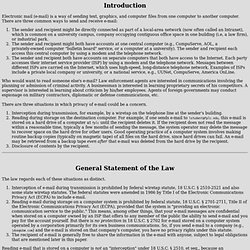
There are three common ways to send and receive e-mail:The sender and recipient might be directly connected as part of a local-area network (now often called an Intranet), which is common on a university campus, company occupying contiguous office space in one building (i.e, a law firm), or industrial park. The sender and recipient might both have accounts at one central computer (e.g., CompuServe, AOL, a privately-owned computer "bulletin board" service, or a computer at a university). The sender and recipient each access this central computer by using a modem and the telephone network. The sender and recipient both have accounts on separate computers that both have access to the Internet. Privacy. Facebook's new face recognition knows you from the side - Apr. 4, 2014. New technology developed by Facebook researchers uses 3-D modeling to identify the subject of an image.

Big Data and data mining. NeWeb Privacy. Biometrics. FBI launches $1 billion face recognition project - tech - 07 September 2012. The FBI thinks you should never have privacy. Section 215 of the USA PATRIOT Act. EFF sued the Department of Justice (DOJ) on the 10th anniversary of the signing of the USA PATRIOT Act in October 2011 for answers about “secret interpretations” of a controversial section of the law.
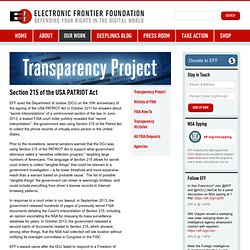
In June 2013, a leaked FISA court order publicly revealed that “secret interpretation”: the government was using Section 215 of the Patriot Act to collect the phone records of virtually every person in the United States. Prior to the revelations, several senators warned that the DOJ was using Section 215 of the PATRIOT Act to support what government attorneys called a “sensitive collection program,” targeting large numbers of Americans. Everything We Know About What Data Brokers Know About You. June 13, 2014: This story has been updated.

It was originally published on March 7, 2013. We've spent a lot of time this past year trying to understand how the National Security Agency gathers and stores information about ordinary people. But there's also a thriving public marketfor data on individual Americans—especially data about the things we buy and might want to buy. NSA Playset. NSA pays tech companies millions to engineer backdoors into encryption protocols. (NaturalNews) There is a saying that says, when it comes to government, they've got you coming and going.

No truer words are spoken when the subject comes to serial invasions of your privacy. Not only is the National Security Agency monitoring your every electronic communication, but the agency is paying your tech company and Internet service provider to hack you as well. According to Britain's The Guardian newspaper, which broke the story of massive NSA spying earlier this year: U.S. and British intelligence agencies have successfully cracked much of the online encryption relied upon by hundreds of millions of people to protect the privacy of their personal data, online transactions and emails, according to top-secret documents revealed by former contractor Edward Snowden.
How the NSA is tracking people right now. XKeyscore: NSA tool collects 'nearly everything a user does on the internet' Government Releases NSA Surveillance Docs and Previously Secret FISA Court Opinions In Response to EFF Lawsuit. The Director of National Intelligence (DNI) just today released hundreds of pages of documents related to the government's secret interpretation of Patriot Act Section 215 and the NSA's (mis)use of its massive database of every American's phone records.
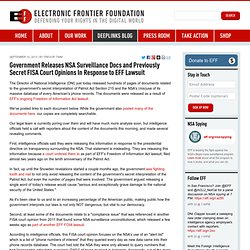
The documents were released as a result of EFF's ongoing Freedom of Information Act lawsuit. We've posted links to each document below. While the government also posted many of the documents here, our copies are completely searchable. Everything you need to know about the NSA and Tor in one FAQ. Documents released by whistleblower Edward Snowden have revealed that the National Security Agency has powerful capabilities to identify and spy on users of the Tor network, three of my colleagues report.
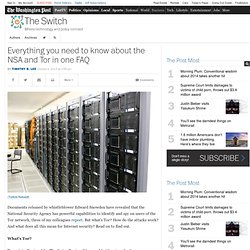
But what's Tor? Does the NSA Tap That? What We Still Don’t Know About the Agency’s Internet Surveillance. The telecom consulting firm TeleGeography's 2013 map of 244 active and planned submarine cable systems (TeleGeography/www.telegeography.com) But like other aspects [4] of NSA surveillance, virtually everything about this kind of NSA surveillance is highly secret and we’re left with far from a full picture.

Who has more access to your data than the Government? Imagine that there was a corporation that had access to your internet activity, your phone records, even down to what snail mail post you receive and from what areas.
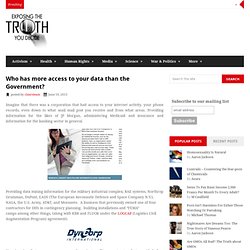
The Top 50 Companies That Mine and Sell Your Data (and How to Opt Out) Safety on the Line: Exposing the myth of mobile communication security. This report evaluates the risks and vulnerabilities of mobile phone services and apps in 12 specified countries: the Republic of Azerbaijan, the Republic of Belarus, the People’s Republic of China, the Arab Republic of Egypt, the Islamic Republic of Iran, Libya, the Sultanate of Oman, the Kingdom of Saudi Arabia, the Syrian Arab Republic, the Tunisian Republic, the Republic of Uzbekistan, and the Socialist Republic of Vietnam.
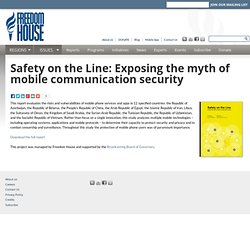
Rather than focus on a single innovation, this study analyzes multiple mobile technologies – including operating systems, applications and mobile protocols – to determine their capacity to protect security and privacy and to combat censorship and surveillance. Throughout this study the protection of mobile phone users was of paramount importance. Download the full report. Malte Spitz: Your phone company is watching.
When GPS Tracking Violates Privacy Rights. PRIVATE Wifi Mobile. Q: “I heard from a friend recently that the U.S. government is demanding back-door access to websites like Facebook, Twitter, Gmail, and others. Is this even legal? PRIVATE Wifi Mobile. Q: “I recently read that Google is providing a lot of user data to the government. Is this even legal? What Price Privacy, Wonders Google. “Every man has his price… To win over people to something, it is only necessary to give it with a gloss of love of humanity, nobility, gentleness, self-sacrifice – and there is nothing you cannot get them to swallow.” – Friedrich Nietzsche.
In the battle for dominance in the social space and victory in the marketing contest raging across social networks, Google is pulling out the stops. Users will only accept intrusive forays into their personal space, and tolerate a certain loss of privacy, if it eventually benefits them so much that the price seems worth paying. Google is trying to fine-tune its attempts at tippy-toeing this thin line with three recent initiatives. Let’s start by looking at where the Big G is today vis a vis social initiatives. Google+ started as a social network, similar in many ways to Facebook and Twitter. Google+ Sign-In image © Google Inc. Big Data is our generation’s civil rights issue, and we don’t know it. As Banks Start Nosing Around Facebook and Twitter, the Wrong Friends Might Just Sink Your Credit. Linkedin challenges US government over data requests. USA to Google, Facebook, Microsoft: No, you can’t tell users we’re spying on them.
How can big data and smart analytics tools ignite growth for your company? European Parliament reportedly wants Google to be broken up. « La vie privée, une anomalie » : Google de plus en plus flippant. « Le vie privée pourrait en réalité être une anomalie. » Non, cette phrase n’a pas été lâchée par James Clapper ni un autre responsable de la NSA. On la doit à Vint Cerf qui n’est autre que le « chef évangéliste de l’Internet » de Google. Google must defend privacy policies to 6 European agencies. Six European data protection authorities will conduct formal investigations of Google's privacy policy after the company repeatedly rejected their requests that it reverse changes it made to the policy last March.
Hidden IP Address. How to Protect Your Privacy from Facebook's Graph Search. Facebook has launched a new feature—Graph Search—that has raised some privacy concerns with us. Graph Search allows users to make structured searches to filter through friends, friends of friends, and strangers. A Parents' Guide to Facebook. Why Europe Is Freaking Out About Facebook Photo Recognition. Facebook Privacy Chart for Teens. ‘Friends’ can share your Facebook profile with the government, court rules. Utilizing RxNorm to support practical computing applications: Capturing medication history in live electronic health records. 81% of Tor users can be de-anonymised by analysing router information, research indicates.
GeoIP2 City. Russian webcam hackers spy on UK homes & offices. Russia Hacked Webcam Scandal. How a Russian Web site peers into your home, and your baby’s room, by hacking webcams.